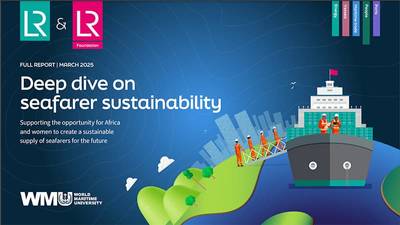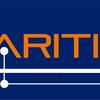New Report Outlines Roadmap to Tackle Seafarer Shortages
A new report published by Lloyd's Register Foundation highlights opportunities to make the number of seafarers more sustainable by investing in Africa's emerging talent and supporting women in maritime roles.
The report, "Deep dive on seafarer sustainability: Supporting the opportunity for Africa and women to create a sustainable supply of seafarers for the future," was carried out by the World Maritime University. The report examines entry barriers for careers in maritime, many of which intersect for both women and those living on the African continent.
It is the first deep dive report in a series exploring the challenges faced by the global maritime sector as part of Lloyd’s Register (LR) and Lloyd’s Register Foundation's Global Maritime Trends research program, which aims to address major maritime challenges in the coming years. Launched in 2023 with the Global Maritime Trends 2050 Report, it includes “deep dive” reports providing expert analysis on critical maritime issues. The first report on seafarers' sustainability was released in London on Thursday, 27 March.
In some countries, the report outlines, women were banned from enrolling in nautical courses, while false beliefs have persisted through the decades that they would be less effective at sea, both for physical and emotional reasons.
Yet, the report highlights that reaching 25% women seafarers by 2050 could be possible by following several steps, which the report breaks down, ranging from awareness campaigns to encourage more girls into STEM, to gender equality policies and targeted scholarships.
While the skills shortage in the industry is not a new issue, it has become an increasingly pressing one in recent years. In 2023, the Global Maritime Trends 2050 report described two possible scenarios to tackle it by having Africa’s young and talented demographic play a pivotal role, or by increasing the number of women seafarers to 25 percent of the total workforce in shipping.
To understand how that could work, a baseline of what training and education as well as the number of seafarers, was required to assess what needs to change to make that happen. The deep dive report concludes that based on the evidence, both are possible, and outlines a clear road map and tangible steps towards each of the targets, including awareness campaigns to get more girls into STEM, gender equality policies and targeted scholarships.
“Diversity has been a challenge across several skills shortage-ridden sectors, but few are experiencing it to the same extent as maritime,” said Professor Momoko Kitada, Head of Maritime Education and Training, World Maritime University, and one of the report’s authors. “Given the growing demands on the sector and other challenges ahead, including the switch to greener energies and sustainability, we felt it was essential to provide governments and industry stakeholders with a clear roadmap to meet maritime’s ambitious workforce targets by tapping onto one key overlooked demographic—the rich talent pool found in Africa and the skills of women.”
The report also dives into entry barriers into the industry for people living in Africa. It found a combination of enrollment disparities for maritime education and training institutions across the continent, combined with low graduation rates (22% at Durban University of Technology, for example) mostly down to limited sea time, prevented potential seafarers from reaching their potential. To bridge the gap, several recommendations are included in the report – such as the funding and establishment of seafarer development programs, as well as global partnerships.















